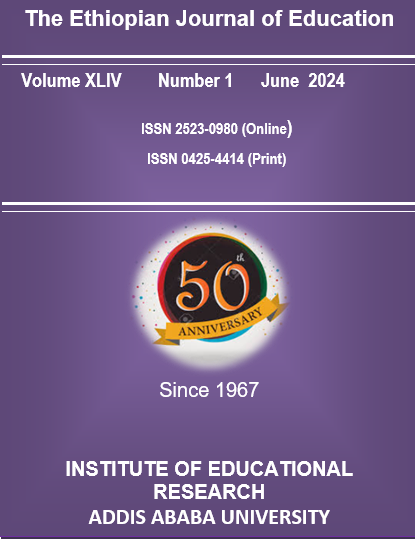Primary and Alternative Basic Education among the Karayu pastoral community of East Shoa Zone: Relevance, Practice and Challenges
DOI:
https://doi.org/10.63990/eje.v44i1.10030Keywords:
pastoral education, mobility, ABE, formal primary education, relevance, practice, challenges, school calendarAbstract
The purpose of this study is to assess the challenges, practice and relevance of the school calendar and traditional full-time formal primary and ABE curriculum to the Karayu pastoral livelihood. The study used an exploratory sequential design of the mixed methods research approach, collecting data from 212 participants in the Fantale district, using key informant interviews, focus group discussions, questionnaires, and observation. Quantitative data were analyzed using descriptive statistics while qualitative data were analyzed using a thematic analysis technique. The result generally revealed that the enrollment rate both in ABEs and primary schools of Karayu pastoral community is low; gender equity is far from being achieved as more males were enrolled compared to females; the gender parity index for GER and NER is less than 1.0, and is also less than the regional average of 0.86; gender gap for GER and NER is positive both in ABEs and primary schools; there is a high proportion of repeaters and dropouts both in primary schools and ABE centers, where the rates are higher for males than for females; the average promotion rate in primary schools is less than the regional average of 82.2%, where this rate is higher for females than for males. The finding also indicated that the existing traditional and full-time face-to-face contact school-based curriculum of both the ABE centers and primary schools as well as the school calendar are not compatible with the real-life experiences, nature of mobility, and cultural norms of the Karayu pastoral community. The Karayu community faces a significant shortage of standard curriculum materials, facilities, and teaching force, compromising education quality and efficiency. To address this, there is a need for culturally sensitive, pedagogically sound, and ecologically feasible education and flexible policies.
Downloads
Downloads
Published
How to Cite
Issue
Section
License
Copyright (c) 2024 Dame Abera

This work is licensed under a Creative Commons Attribution 4.0 International License.


